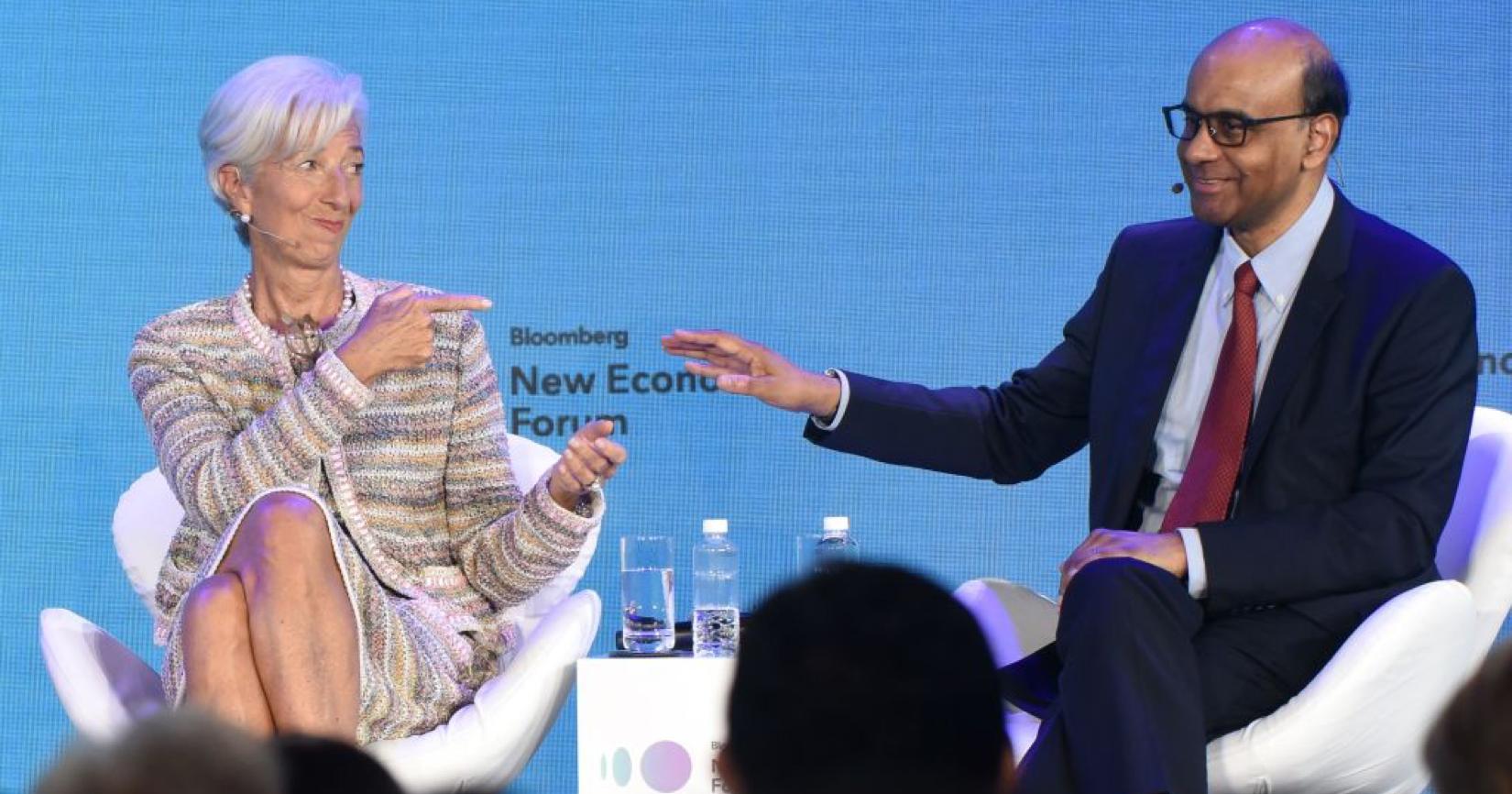The head of the International Monetary Fund (IMF), Christine Lagarde, is stepping down.
She has a job at the European Central Bank lined up, but a successor must be chosen for one of the world's most important posts.
Rumours are spreading that a familiar name to us may be up for the top job -- none other than Senior Minister Tharman Shanmugaratnam.
Tharman for IMF Head?
On July 4 (Singapore time), the New York Times reported that Tharman's name was on the "shortlist" of people being tapped to take over from Lagarde.
Other candidates included Governor of the Bank of England Mark Carney, former UK Chancellor of the Exchequer George Osborne, and Agustín Carstens, former IMF deputy managing director.
Traditionally, the job of the Managing Director of the IMF has been held by a European, and Europe has a "higher voting share".
Previous incumbents have included Frenchmen, Spaniards, and Germans.
Tharman would be a good candidate
Tharman's credentials are of course, stellar.
As Singapore's former Finance Minister and the former Coordinating Minister for Economic and Social Policies, the man knows his way around national economies.
He was also the chairman of the International Monetary and Financial Committee, the key policy forum of the IMF, from 2011-2014. Tharman was its first Asian chair.
Tharman also chairs the Group of Thirty, an independent global council of economic and financial leaders.
And he's no stranger to wowing Europeans with his insights.
But the IMF is unpopular
By all accounts, Tharman would be a good head of the IMF.
But consider the IMF's role. Its stated goal is to maintain the stability of the global finance system.
It does this by:
- Monitoring the economic policies of its member countries.
- Providing loans to countries experiencing financial troubles.
- Helping countries restructure their economies to modernise their policies and institutions.
Sounds good. But in reality, the IMF's policies have come under criticism. In return for their loans, they may make demands that the recipient country finds excessive.
The Nikkei Asian Review reported on June 5 that Pakistan will have to come up with US$5 billion (S$6.8 billion) worth of expenditure cuts and taxes in exchange for a US$6 billion (S$8.1 billion) loan over three years.
Tariffs on electricity and gas are expected to rise, likely fuelling the resentment of the man on the street.
The Asian Financial Crisis of 1997
History also provides examples of the IMF's unpopularity.
There remain sore memories of the IMF stemming from 1997, the peak of the Asian Financial Crisis.
As mentioned by Bloomberg, one of the most infamous images to emerge from the period was that of then-IMF Managing Director Michel Camdessus watching then Indonesian President Suharto with his arms folded, as the latter signed an unpopular bailout agreement that entailed painful reforms.
 Photo by AGUS LOLONG/AFP/Getty Images.
Photo by AGUS LOLONG/AFP/Getty Images.
There was also speculation that the IMF’s measures were part of a greater conspiracy by the U.S. to oust Malaysia’s Prime Minister Mahathir Mohamad and Suharto from power.
The IMF’s reputation was not helped by the fact that Malaysia managed to recover from the crisis as a result of Mahathir’s decision to shun the IMF and impose capital controls instead, The Malay Mail reported.
Suffice to say, emotions regarding the IMF’s role during that period of time still run high.
Jokowi make Indonesia great again! pic.twitter.com/JFHbv2IB1q
— Manguni (@ronaldwj14) February 27, 2018
So having a Singaporean serve as the head of a global organisation that can engender resentment may not be the best idea.
Goh Chok Tong, once floated as a potential candidate for UN Secretary-General
Retired diplomat Bilahari Kausikan described a situation in his book Singapore is Not an Island that may sound familiar.
He described how former Prime Minister Goh Chok Tong was at one time tapped to become a potential candidate for the Secretary-General of the United Nations.
While others were excited about having a Singaporean in such a prestigious post, Bilahari viewed it differently. He wrote:
"Specific names began to be mentioned, including former Prime Minister Goh Chok Tong and former Foreign Minister Professor S Jayakumar. It soon became clear that if either had run for the post, Singapore would have been practically a shoo-in. But I thought it was an extremely bad idea."
Bilahari described how the Secretary-General had almost no power, and is subject to lobbying by the Permanent Five members of the Security Council while at the same time having to deal with the General Assembly.
With frequent clashes of opinion, the Secretary-General and his country of origin "almost always ends up pleasing nobody."
Bilahari added:
"It is an impossible job. I saw no real political advantage for Singapore, only downsides and potential disasters to our credibility."
While there are substantial differences in the two roles, a potential Tharman reign as IMF head may not be 100 per cent positive for Singapore either.
Top image via ROSLAN RAHMAN/AFP/Getty Images.
If you like what you read, follow us on Facebook, Instagram, Twitter and Telegram to get the latest updates.
